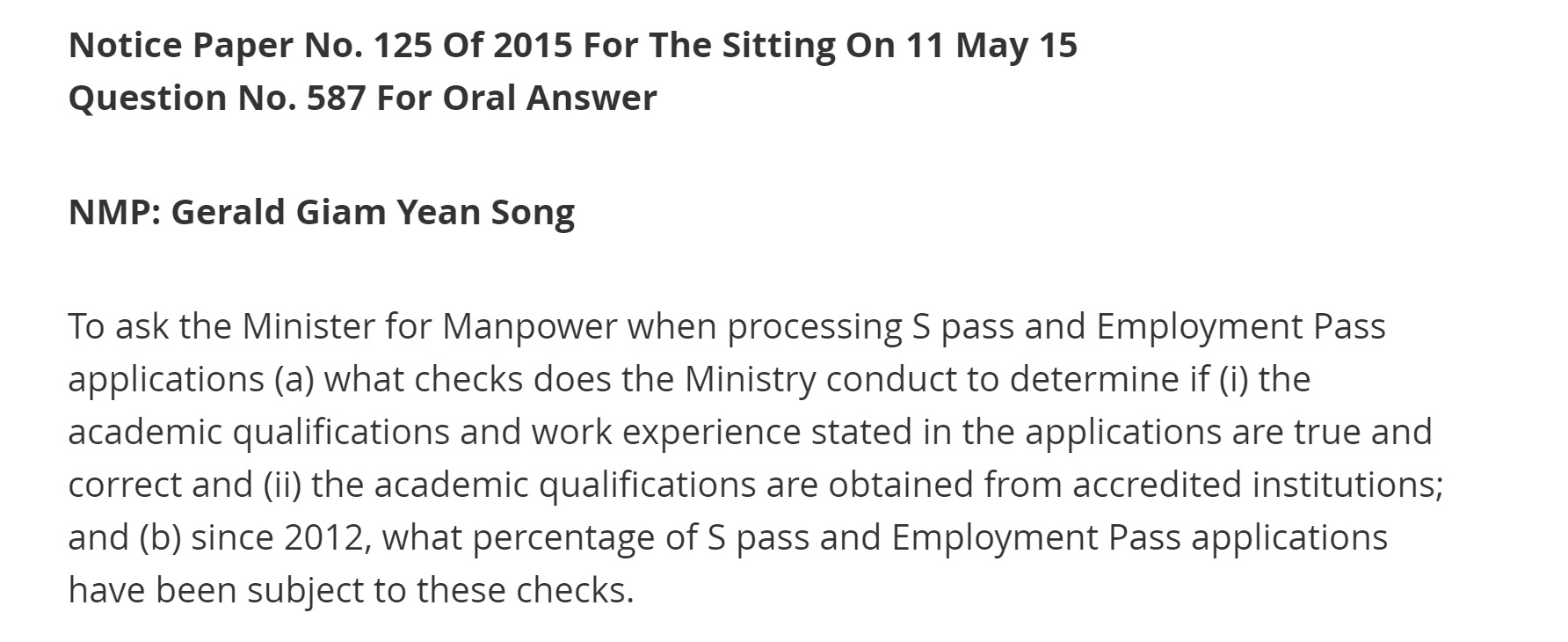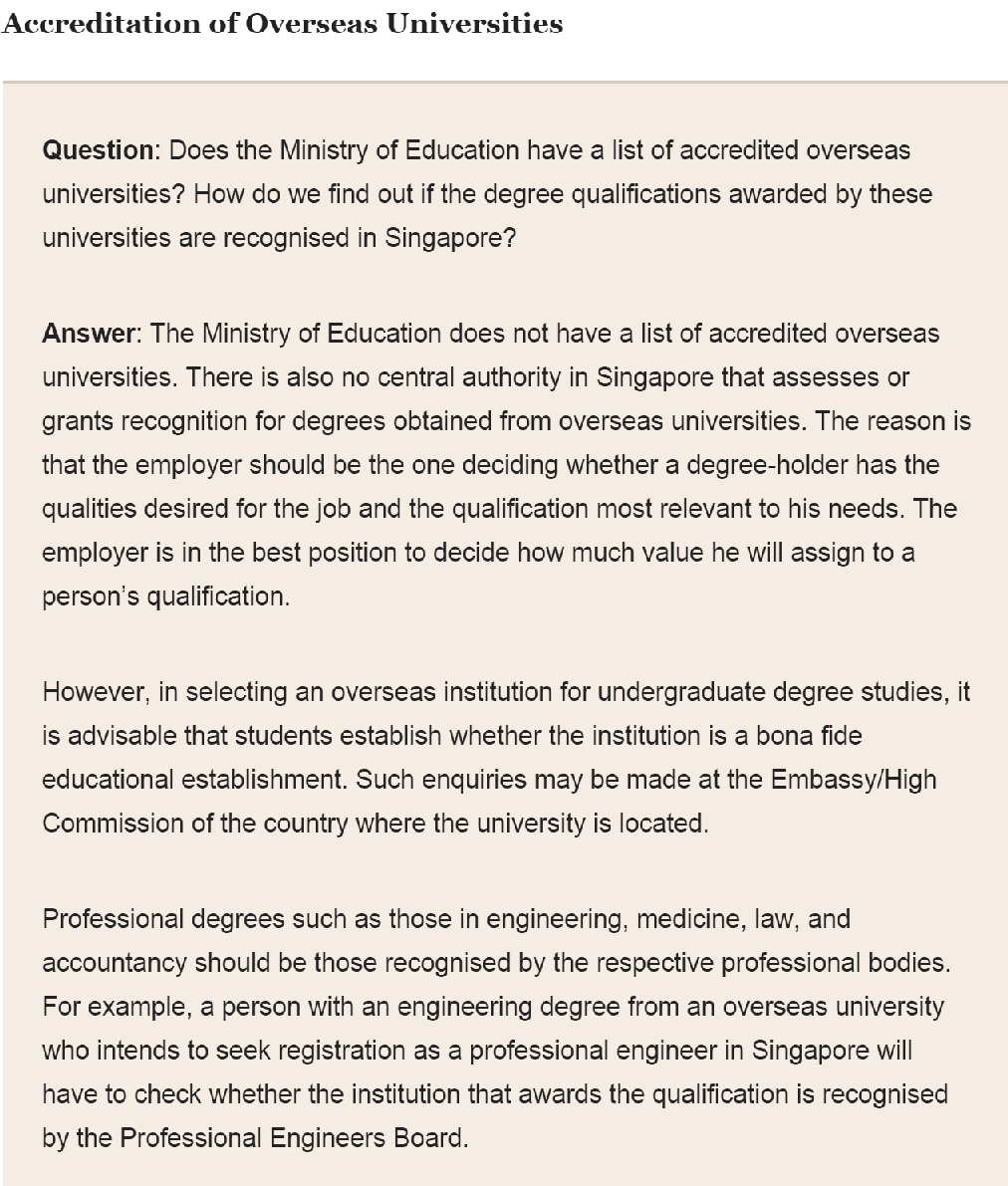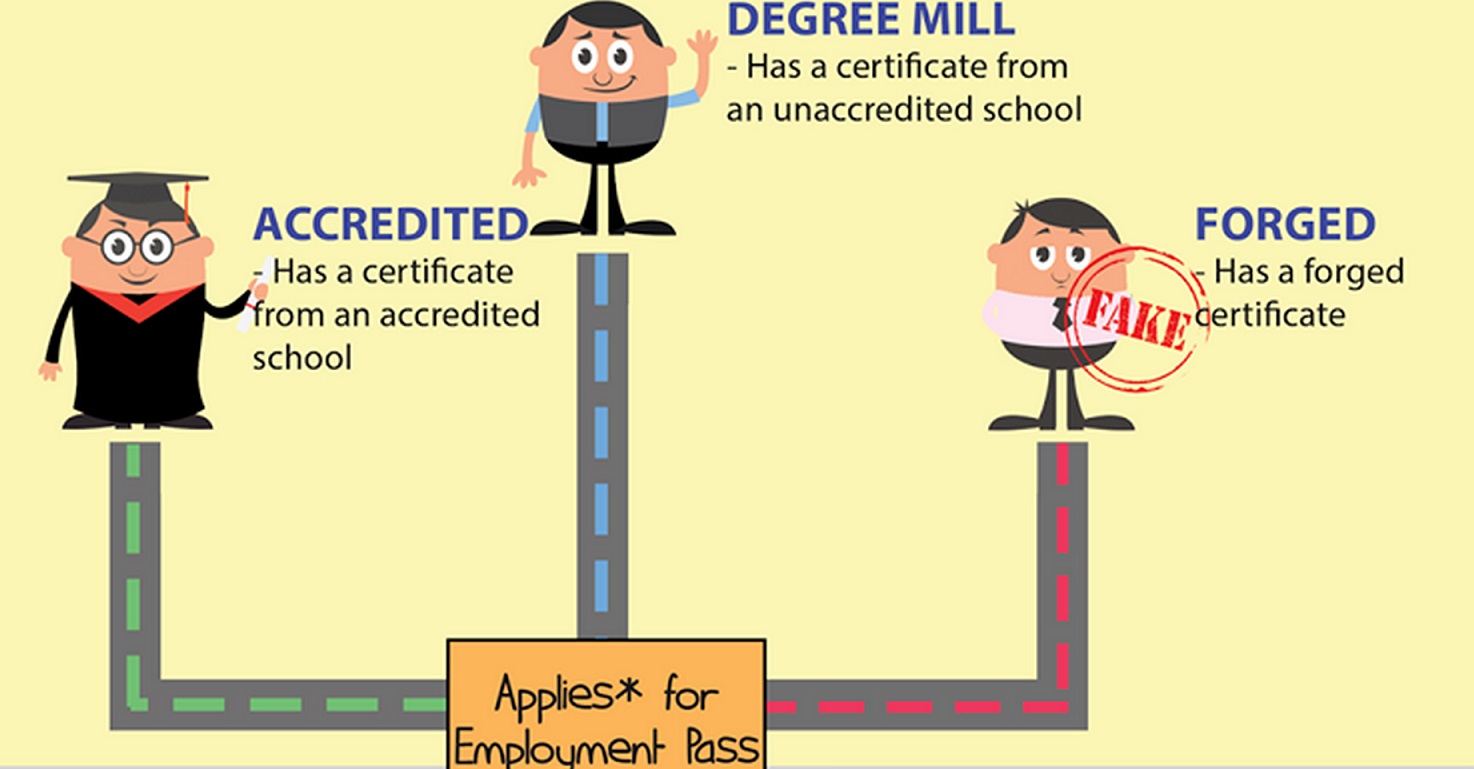For anyone who missed out on the whole degree mill hooha last month, netizens had uncovered an Infocomm Development Authority (IDA) employee who had obtained an MBA from a known degree mill.
IDA stood by its decision and said that they hired the person based on her Bachelor's degree and work experience. IDA also said that the employee "had genuinely believed her MBA programme to be bona fide, and she had put in effort to obtain the qualification."
This led to discussions online about the validity of degrees from degree mills when applying for a job in Singapore.
This also prompted NCMP Gerald Giam to ask newly minted Manpower Minister Lim Swee Say in parliament on how the Ministry of Manpower (MOM) manages S pass and employment pass applications based on the authenticity of qualifications.
 Source: MOM website PS: It is NCMP Giam, not NMP Giam
Source: MOM website PS: It is NCMP Giam, not NMP Giam
The MOM also released the following infographic to shed light on the issue:

MOM states that "employers have a primary responsibility to ensure the authenticity and quality of the academic qualifications submitted".
How easy or difficult will it be for employers to differentiate between 'Forged', 'Degree Mill' and 'Accredited' applicants?
From the infographic, it is a straightforward outcome for people found using fake degrees - they will never be able to work in Singapore.
In other words, MOM has provided a clear stand on how they treat forged degrees (barred from working here) and those from degree mills (have their degrees disregarded in the work pass evaluation proccess) in the Employment Pass and S-pass applications.
However, when it comes to 'Accredited' and 'Degree Mill' applicants, it becomes a little confusing as to what constitutes a degree from an accredited university or a degree mill.
Confusion One: Lumping Degree Mills with Unaccredited Universities
Unaccredited higher-learning institutions, according to Wikipedia, are higher education institutions such as colleges, trade schools, seminaries, and universities which do not have formal educational accreditation. Degree mills or diploma mills are unaccredited higher education institutions that offer illegitimate academic degrees and diplomas for a fee.
From MOM's infographic, it appears like they are treating unaccredited schools as one and the same as degree mills in their employment pass processes.
However, it is clear to all that there is a distinction between unaccredited schools and degree mills.
Some people may want to know what if someone had attained a degree from an accredited institution but lost its accreditation right after that person has attained a degree. Is that person's degree to be regarded or disregarded by MOM?
*Edit at 3.10pm: MOM has posted a statement on its own Facebook providing more clarity on the spectrum of qualifications coming out of degree mills. It also said that it had "little tolerance for applicants with questionable integrity" and that checking the "integrity of an applicant should be a shared responsibility between the employer and MOM". The statement is in the screenshot below*

Confusion Two: There are unaccredited/accredited universities, and then there are unapproved/approved qualifications. So, which is which?
The Ministry of Education (MOE) said that for professional degrees such as those belonging to engineers, it advised individuals to check with professional bodies such as the Professional Engineers Board which keeps a list of 'Approved Qualifications'.
Similarly, for lawyers, the Ministry of Law also keeps a list of approved universities. It was reported in Feb 2015 that eight UK universities were removed from the approved list. Here are the eight:

MOE has said that it does not have a list of accredited universities. Should employers then take approved/unapproved universities as a yard stick? I.e. Do we assume that a degree from any of the eight universities which are listed as unapproved to be as good as unaccredited?
The quick answer is no.
While aspiring lawyers will be unable to practice law in Singapore if they attend these eight universities, the universities can still be accredited institutions - one just needs to double check with the High Commission of the United Kingdom. The process of finding out whether a school is accredited is elaborated in a later point below.
People who pursue an MBA with say, University of Manchester, can breathe easy that although a law degree from there is not approved here, the MBA still stands, as long as the University of Manchester remains accredited in the UK. If not, we can always ask its distinguished alumnus DPM Teo Chee Hean (Just kidding, we hope his alma mater remains accredited by the UK government or he will end up having a certificate from a degree mill - going by the logic of the MOM infographic).
Confusion Three: How do you know if a university is accredited?
Unfortunately, MOE does not have a list of accredited overseas universities.
Judging from the MOE FAQ list, the question on accredited universities is the most popular FAQ.
 Source
Source
This was taken from MOE's FAQ page:
 Source: MOE website
Source: MOE website
In answering the question on finding out whether a university is accredited, MOE advises students to "establish whether the institution is a bona fide educational establishment. Such enquiries may be made at the Embassy/High Commission of the country where the university is located".
Granted, it may be diplomatically unwise for MOE and MOM to come up with a list of accredited overseas universities for that will irritate other countries. Imagine the outrage from the US Embassy if MOE or MOM were to inform the public that Harvard University is no longer accredited and that Southern Pacific University has joined MOE's accredited list.
However, we wonder if MOE/MOM could do more to link employers to education officers of Foreign Missions located in Singapore. For instance, it will be difficult for employers to assess whether the universities are accredited if a certain country does not have a mission based in Singapore.
So we are back to MOM again.
Confusion Four: Why doesn't MOM send a strong signal to discourage people from using Degree Mill qualifications in their applications?
MOM disregarding these degree mill qualifications show that these qualifications have little value-add to the workforce. Is there a system for MOM to warn employers that their potential employee is holding onto degree mill qualifications?
This is an important question, because the current system places the onus of checking qualifications on employers who are not legally-bound to do so.
There is a chance that employers may pass over candidates with equal work experience but with lesser paper qualifications (diploma or ITE certificate) over candidates with degree mill qualifications.
Singapore aims to maintain a strong Singaporean core with foreign talents complementing our workforce.
A good first step is to apply the same stringent criteria and reject candidates with degree mill qualifications.
Checking whether an institution is bona fide could be a simple matter of calling or emailing the relevant authorities. If people who want to work in Singapore fail to exhibit prudence and attentiveness before investing time and money in trash-tier degrees, would Singapore benefit from having such individuals in its work force?
If you like what you read, follow us on Facebook and Twitter to get the latest updates.
If you like what you read, follow us on Facebook, Instagram, Twitter and Telegram to get the latest updates.
